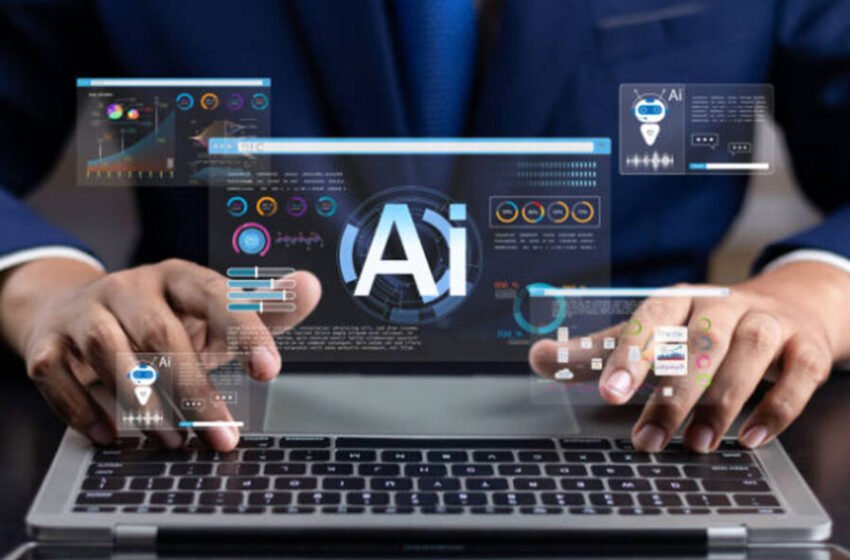AI in Digital Marketing: Transforming Strategies with Smart Technology

Digital Marketing is dynamic, progressing with every passing day, having been invaded by artificial intelligence. Customers expect speed and personalized experiences, and marketers are turning to artificial digital marketing for solutions. It is automating repetitive routine activities, analyzing big data sets, and delivering high-quality customer interactions. Marketers, therefore, are looking for an intelligent, insightful person who has all the data to process marketing campaigns.
This article discusses how AI transforms the digital marketing sector as well as gives authoritative views on its applications, benefits, challenges, and potential for the future.
What is AI in Digital Marketing?
AI in digital marketing is the application of artificial intelligence technologies to enhance marketing activities. This may be in the form of using machine learning and natural language processing, predictive analytics, and automation tools mimicking human intelligence for native optimization of campaigns and a better understanding of customer behavior.
Different functions of AI in digital marketing involve audience targeting, content development, customer service, and performance monitoring. Such AI-enabled tools have become very critical for marketers in making real-time decisions, improving ROIs, and ultimately creating more personalized experiences for marketing.
Some Major Applications of AI in Digital Marketing
1. Customer Segmentation and Targeting
By utilizing advanced segmentation analysis, demography, and behavior data, we were able to obtain further attributes that clarify audience clusters. Thus, it provides marketers with possible conceptualizations for each segment, leading to increased engagement and conversion rates.
2. Personalization at Scale
AI enables hyper-personalization through analyzing various user data like browsing activity, past transactions, and preferences, delivering personalized content or products recommendations. For example, Weygandt and Netflix have set high standards in personalization, completely driven by AI.
3. Chatbots and Virtual Assistants
Chatbots use AI to provide real-time customer support by answering questions and guiding users through a sales funnel. These chatbots absorb NLP to understand and respond correctly to a user.
4. Predictive Analytics and Forecasting
Using machine learning tools, AI predicts future consumer behavior trends, trends that marketers can then react to and preemptively design campaigns. Involvement in predictive analytics includes lead scoring, sales forecasting, and customer lifetime value predictions.
5. Programmatic Advertising
Programmatic advertising is using AI algorithms for automating the real-time ad space purchase. It resulted in more efficient ad placements with better targeting and optimized budget allocation.
6. Content Creation and Curation
AI can generate different forms of content, ranging from email subject lines to social media captions or full articles. Jasper, Copy.ai, and many others provide assistance in high-performing content generation for specific audiences.Additionally, an AI music creator can be used to generate background music for videos, podcasts, or other content, making the overall production process more seamless.
7. Voice and Visual Search Optimization
Most people have started using intelligent devices, and that is why voice and visual searches are on the rise, making this an important area of optimization. AI uses these interactions to assess how people use their devices, which helps improve results, enhance SEO, and provide a better user experience.
Benefits of AI in Digital Marketing
Efficiency and Automation: It takes lots of time to do repetitive things like analyzing and summarizing all data and results of email marketing and answering customer inquiries, leaving time for strategic planning to be freed.
Data-Driven Insights: A marketer can then analyze the huge data sets quickly and with the accuracy that is paramount to making better marketing decisions.
Improved Customer Experience: Highly personalized content and support with the aid of AI bring satisfaction to the customer.
Save Costs: Automation and effective targeting have reduced the costs a company incurs in acquiring as well as retaining customers.
Real-Time Optimization: It becomes possible to adjust a campaign in real-time depending on an analytical view of performance, thus clarifying it that the return on investment has improved.
Challenges and Ethical Considerations
Nevertheless, there are many challenges that AI will have to face upon entering into digital marketing:
Data Privacy: User data collection and analysis should comply with regulations such as GDPR and CCPA. Marketers should prioritize the ethics of data use, as their practices do not allow it.
Biases in Algorithms: AI systems often reflect the biases of the data used to train them, which can result in unfair outcomes or more severe exclusion of entire groups.
Dependence on Data Quality: Poor and wrong data will turn AI results into an inaccurate state of affairs, and it will end up in a bad marketing strategy.
Loss of Human Touch: Over-reliance on machines may reduce the amount of time people spend building up genuine human interactions that are necessary for brand-building.
Transparency and Trust: Consumers may be suspicious of AI-driven interactions. AI will thus have to be communicated clearly.
The Function of AI in Different Digital Marketing Channels
1. Email Marketing
Through conducting A/B tests, optimizing timing for send-outs, and personalizing content, AI enables email campaign optimization. AI tools track the activity of subscribers to enhance open and click-through rates.
2. Social Media Marketing
The rise of AI in social media marketing helps marketers track trending topics, analyze sentiment, automate posting schedules, and assess performance analytics, allowing brands to connect meaningfully with their audience.
3. Search Engine Optimization (SEO)
AI facilitates search analysis for trends in keywords, opportunity identification, and on-page optimization suggestions. An AI-based SEO strategy becomes imperative since Google’s algorithm updates mostly rely upon AI capabilities.
4. Content Marketing & Repurposing
5. Paid Advertising (PPC)
Bids, advertisements, and ad performance tracking get automated through AI in Google Ads, Facebook Ads, and other similar platforms. This process leads to more efficient spending and optimal results.
Case Studies: Successful Use of AI in Digital Marketing
1. Coca-Cola.
Coca-Cola makes use of AI technology to understand customer preferences and market trends that shift collaborative ad campaigns between customers’ lives and new product innovations based on predictive insights.
2. Sephora.
A virtual assistant that uses AI at Sephora provides beauty recommendations and appointments and creates simulations of how the makeup will look to further improve the experience while shopping online.
3. Nike.
Nike has implemented AI systems to customize the product offerings according to customers’ needs and optimize email marketing campaigns, thus enriching customer engagement and growing the sales levels.
Beyond marketing, brands in sectors like AI in healthcare are also witnessing transformations where personalized treatments and patient care services are being revolutionized.
Upcoming Trends: What is Ahead in AI for Digital Marketing
1. Hyper-Personalization
AI will attune its personalization to the atomic, so no customers will ever again have common related experiences while shopping on the same day, provided the intimate deep behavior and contextual insight.
2. Voice and Conversational Commerce
Voice-activated AI assistants will play an important role in commerce, from product discovery to the final purchase.
3. Augmented Reality (AR) and AI
Combining AR and AI could revolutionize online shopping by providing personalized, immersive experiences when shopping for products.
4. Advanced Sentiment Analysis
Artificial intelligence creations will respond to the universe-in with much deeper understandings of the human emotional spectrum, giving the brands room to message-adjust according to their users’ emotional responses almost instantaneously.
Thus, the future of AI in digital marketing will further support better creativity, decision-making, and customer interaction.
Frequently Asked Questions (FAQs)
What is AI in digital marketing?
That is the definition of AI in digital marketing. AI in digital marketing refers to the use of artificial intelligence technologies that assist in improving marketing strategy, automating a few tasks through them, and personifying customer engagement.
How is AI used in digital marketing?
We are using AI for customer segmentation, predictive analytics, content generation, chatbots, programmatic advertising, and performance optimization.
Does AI replace digital marketers?
Digital marketers’ job enhancements are what AI could do; it does not replace them. Human creativity and strategic thought should be considered, though.
What are the advantages of using AI in digital marketing?
More efficient return-on-investment parameters are some important benefits of AI in marketing.
Are there risks in marketing with AI?
Data privacy, algorithm bias, over-automation, and bond diminution are definitely on the risk radar.
Conclusion
AI in digital marketing is not some flashy new trend. Data drives today’s world, making it a strategic imperative. From hyper-personalized experiences to automation through real-time analytics, AI is helping marketers connect more efficiently and effectively with their audiences.
The risk factor will soon be resolved when the AI system is intelligently identified, and the plane will benefit from the mile-high crowd that would far exceed the disadvantages. With a focus on detail and the integration of human creativity and empathy, marketers will have unprecedented opportunities.
The future of AI in digital marketing will be brought forth by innovations and the ethical use of technology. Brands that develop this transformational process today will be the ones that lead the market tomorrow.





